
We kindly inform you that, as long as the subject affiliation of our 300.000+ articles is in progress, you might get unsufficient or no results on your third level or second level search. In this case, please broaden your search criteria.

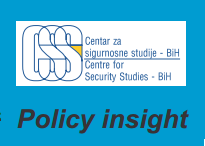
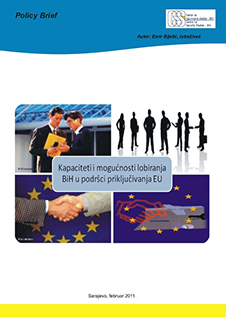
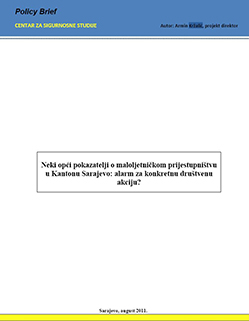
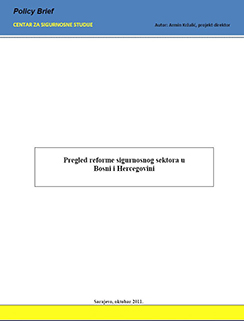
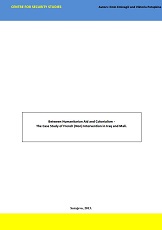
Corruption as defined by Transparency International considers the “misuse of public duty for the achievement of personal gain”, the United Nations considers corruption (definition from the UN IX Congress in Cairo in 1995) as „...any offer, promise or giving of any advantage to another person as undue consideration for performing or refraining from the performance of that person’s duty, or the soliciting or accepting of any advantage as undue consideration for performing or refraining from the performance of one’s duty.“ It is either bribery or any other act related to persons entrusted with responsibilities, aiming to influence their performance in their official duties and obtaining any improper advantage for themselves or others. This occurrence, however, in Bosnia and Herzegovina in its post-war period is ever-present in most aspects of public life ranging from high political institutions to the lowest level of institutions. One very pertinent example would be corruption in institutions of higher learning. This paper will look at some of the cases of corruption and discrimination at the University of Tuzla, followed by an analysis of the University's statute, in order to gain insight on how this issue is being regulated, and to see whether there are any mechanisms to prevent corruption, as well as to ensure the security of staff and students.
More...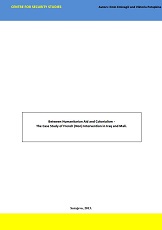
This paper is designed as a comparative case study of France’s (non) involvement in two regions – Iraq in 2003 and Mali in 2013. The time frame of ten years allows for a retrospective analysis of the possible decisions influencing French politicians to make the decision to not intervene in Iraq. The case of Mali is a rather new event and thus requires immediate attention to understand the underlying reasons for military action. Such a case study presents an intriguing opportunity for comparison. In regard to the case of the intervention in Iraq, France had immediate economic interests in the country, however, it, to this day, remains the most vocal opponent of the intervention, regardless of the fact that a large number of North Atlantic Treaty Organization (NATO) members participated in one way or another in the Operation Iraqi Freedom. In the case of Mali, France does not have any apparent economic interests in the region; however, it is the only NATO state carrying out the military operation in the country unilaterally as of writing of this paper. However, it is not our intention to provide definitive answers on certain points of involvement and non-intervention, nor mark processes, but rather to provide a grassroot analysis on the case study of Mali that would potentially best explain particular aspects of theoretical implications. With the aim of presenting and analyzing two different choices of French foreign policy, this paper will make use of the tools of comparative analysis in order to construct an interpretivist case study. Academic books and articles, direct speeches of involved politicians, various economic statistical data, opinion polls, as well as United Nations (UN) Reports will be used in the analysis. It will look at theoretical ramifications as well as empirical data from relevant research institutions, using data gathered from United Nations Security Council (UNSC) reports regarding peace building in post-conflict zones as an initial starting point.
More...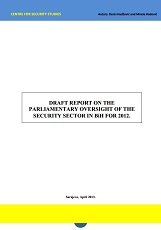
Parliamentary oversight of the security sector in Bosnia and Herzegovina, in spite of its evident headway in employing oversight functions, has not yet achieved its full capacity. For the purpose of this project, the Centre for Security Studies has prepared a Report draft aimed at providing an assessment work efficiency of the parliamentary committees. This report seeks to address the issue of fulfilling the key-responsibilities in the democratic oversight of the security sector in the year 2012. The objective of this research is to determine the improvement of the overall quality and efficiency in implementing parliamentary oversight of the security sector in Bosnia and Herzegovina. This segment of civil society involvement is important for achieving greater accountability and transparency of defense and security institutions over which Parliamentary Committees maintain oversight, consistent with positive legislation. This research has thrown up many questions in need of further investigation. Further work needs to be done to establish a more comprehensive discussion amongst the members of Parliamentary Committees and representatives of defense and security institutions, in particular on the need of structural planning and implementing a more efficient parliamentary oversight of the security sector in the upcoming period.
More...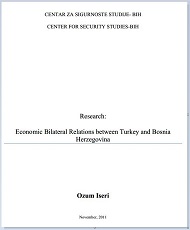
There have been considerable changes in Turkey’s foreign policy since 2002. Indeed, current Turkish Foreign Minister and former foreign policy advisor of Prime Minister Recep T. Erdogan, Mr. Ahmet Davutoglu’s Strategic Depth doctrine which considers Turkey’s strategic foreign policy on the basis of geographical and historical depth (referring Ottoman Empire) gives a framework for the Turkish foreign policy. Indeed, Davutoglu names 5 principles regarding Turkish foreign policy. They are; the balance between security and democracy; zero problems towards neighbors; proactive and pre-emptive peace diplomacy; a multi-dimensional foreign policy, and lastly rhythmic diplomacy2 . In fact, the doctrine and these principles demonstrate the logic behind the Turkish endeavors in the Southeast Europe (SEE) and Bosnia and Herzegovina (BiH).
More...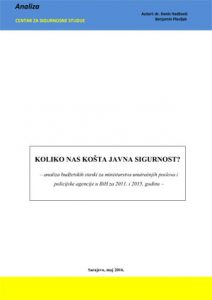
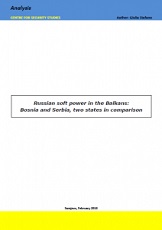
Currently (2018), the two main supporters of the region, the USA and the EU seem both too taken by their internal problems. Europe is indeed losing its attractiveness because of its own crisis and above all after Juncker’s statement about no chances of enlargement in the next 5 years1, postponing the process to 2025. On the other side, there are Turkey and Russia. Turkey, with its neo-Ottoman foreign policy, is playing a great role in the area, offering a new authoritarian model. Russia, also exploiting this vacuum left by the West, is trying to affirm its influence, mainly using the Orthodox Church ties and weapons trade. The most affected countries are Serbia and Bosnia Herzegovina: in different ways, approaches and perspectives, but they are the ones Russia is looking to in strengthening its position in the region, above all after Montenegro’s NATO accession. Hence, the research is going to focus on the comparison between Russian interference in Serbia, always considered a great ally with shared roots and traditions, and BiH where Russian presence is peculiar, through a direct impact on the Serb and Croat political leaders.
More...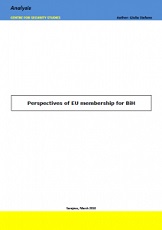
Although the positive attitudes of EU towards Western Balkans enlargement, so many steps have still to be taken in the region for achieving EU membership. Only Montenegro and Serbia, the former more than the latter, look ready for a forthcoming accession. Montenegro’s accession negotiations started in 2012 and at the moment it is the richest Western Balkans’ country1, it joined NATO last year, and the main problem to be overcome is corruption. Concerning Serbia, the biggest country of the region, for its controversies a possible accession would foster stabilisation in Western Balkans, nevertheless the relations with Pristina should be regularised before confirming any kind of membership. To the light of the EU proposals and intentions, it is necessary to understand which are the gaps to fill in BiH, for it to become a candidate country, and which are the political, social and economic aspects the country has to improve for achieving EU accession.
More...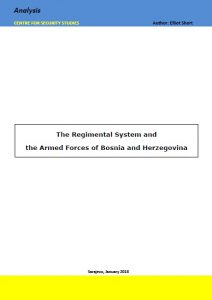
The regimental system is a method of military organisation developed by the British Army over the last 300 years, variations of which can be identified in the present-day armed forces of numerous Commonwealth states including Australia, Canada, India, Pakistan, and the United Kingdom (UK). Despite its widespread application and well documented history, however, any definition of the Regimental System must remain fluid. Socio-economic developments, coupled with advances in technology and military organisation, means that the parameters of what a regiment is – in terms of structure, composition, identity, and purpose – are constantly changing. David French, in his detailed study of military identities in the British Army, postulates that ‘the language of the “regiment” is so shot through with anomalies that to talk of a “regimental system” is itself almost a misnomer, for there was much about it that was anything but systematic.’1Perhaps the only consistent observation of the Regimental System focuses on its abstract, emotional appeal. When joining a regiment, a soldier enters a community which offers them an inspirational heritage, a legacy to defend, and the support of a “family” in a manner considerably more personal than the faceless bureaucracy of an army organised along the lines of the continental system. Such a dynamic, it is argued, fosters esprit de corps and boosts the morale of troops, ultimately leading to increased combat effectiveness and cohesion. Over 130 years after Edward Cardwell reformed the British Army and established the Regimental System, the model was applied to the newly integrated Armed Forces of Bosnia and Herzegovina (Bosna i Herzegovina, BiH; AFBIH), a military with no significant historical links to the British Army or the wider Anglosphere. This paper will offer an overview of the origins and development of the regimental system in a number of countries, explain how such a system came to be applied in BiH, and compare the application of the system in the AFBiH with other militaries which utilise it. The strengths and weaknesses of the regimental system in the AFBiH will then be considered, and the report will conclude with an analysis of how the regimental system could be reformed in order to strengthen the AFBiH.
More...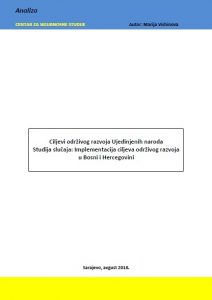
Bosnia and Herzegovina, as a member state of the United Nations, committed itself to permanently contribute in improving the situation in the society, based on its priorities and needs. Im-plementation of the goals of sustainable development in Bosnia and Herzegovina coincides with the priorities in relation to its aspirations for membership in Euro-Atlantic integrations. This is confirmed by the statement of the Head of the European Union Delegation to Bosnia and Her-zegovina and EU Special Representative, Ambassador Lars Gunnar Wigemark, that the Reform Agenda is a great opportunity for Bosnia and Herzegovina to " to catch up with the rest of Eu-rope and join the EU family". In the document "Strategy of the Foreign Policy of Bosnia and Herzegovina for the period 2018-2023", it is emphasized that "that the authorities of Bosnia and Herzegovina will intensify their activities in order to contribute to the global sustainable development goals by adopting an ac-tion plan and roadmap for achieving the goals of sustainable development in the forthcoming period". However, there is still a lot of work to be done by local and national government repre-sentatives in meeting the sustainable development goals, and in particular the activities to be carried out in the forthcoming period in order to develop and adopt the National Strategy for Sustainable Development. The creation and implementation of this document is of utmost im-portance, both due to a better vision of the representatives of the national and local authorities of Bosnia and Herzegovina towards the priorities of the implementation of sustainable devel-opment goals and the promotion of the visibility of the of sustainable development goals in the country. Finally, it should be emphasized that the willingness and interest of each country to fulfil the United Nations sustainable development is conditioned by its geographical position as well as economic, social and political conditions. Taking into account all these features, it is undeniable that Bosnia and Herzegovina's progress in implementing sustainable development goals is sub-ject to a lot of demanding work and planning, especially in those areas not explicitly mentioned in the United Nations Agenda.
More...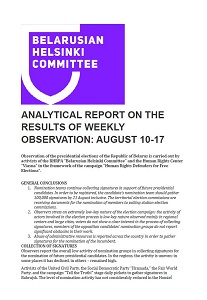
Observation of the presidential elections of the Republic of Belarus is carried out by activists of the RHRPA "Belarusian Helsinki Committee" and the Human Rights Center "Viasna" in the framework of the campaign "Human Rights Defenders for Free Elections".
More...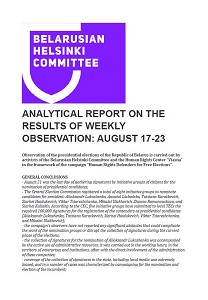
Observation of the presidential elections of the Republic of Belarus is carried out by activists of the RHRPA "Belarusian Helsinki Committee" and the Human Rights Center "Viasna" in the framework of the campaign "Human Rights Defenders for Free Elections".
More...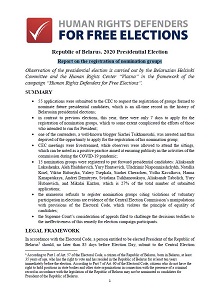
Observation of the presidential election is carried out by the Belarusian Helsinki Committee and the Human Rights Center “Viasna” in the framework of the campaign “Human Rights Defenders for Free Elections”.
More...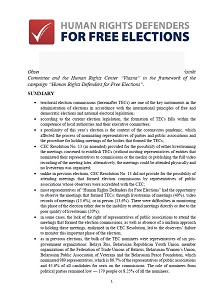
Observation of the presidential election is carried out by the Belarusian Helsinki Committee and the Human Rights Center “Viasna” in the framework of the campaign “Human Rights Defenders for Free Elections”.
More...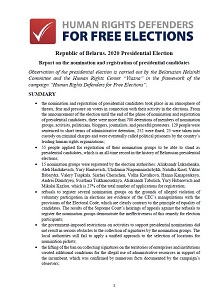
Observation of the presidential election is carried out by the Belarusian Helsinki Committee and the Human Rights Center “Viasna” in the framework of the campaign “Human Rights Defenders for Free Elections”.
More...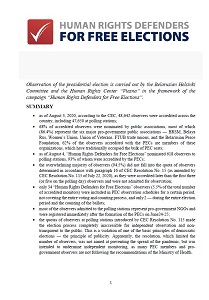
Observation of the presidential election is carried out by the Belarusian Helsinki Committee and the Human Rights Center “Viasna” in the framework of the campaign “Human Rights Defenders for Free Elections”.
More...